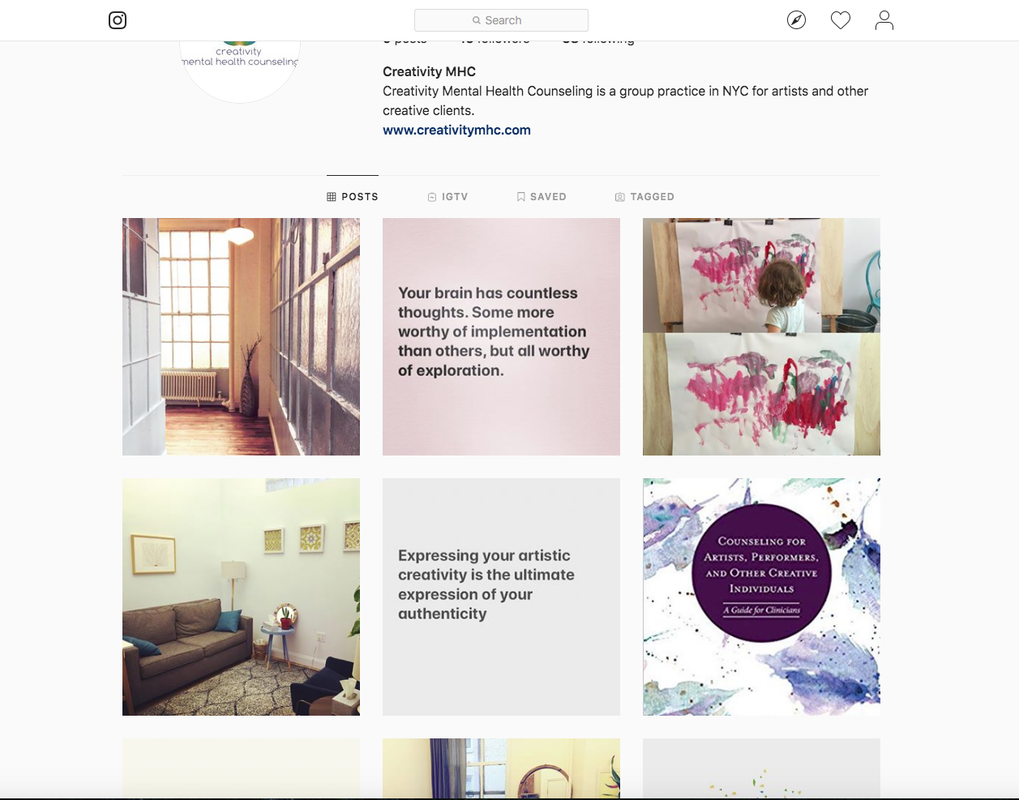 The creative process isn’t always smooth. Sometimes, you get stuck in one of the stages of idea development and implementation. When this happens, it’s important to identify - the poor habits during engagement in creative work (are you trying to create when you need to be somewhere 30 minutes later? are you creating in the presence of a critical/judgmental person? are you beginning creative work with your phone notifications going off every few minutes?) - the psychological factors that get in your way (are you filled with fear and self-doubt? did you just receive upsetting news that you need time to process?) During counseling, try opening up with you therapist about the kinds of thoughts that interfere with your creative process. The goal would be to set up an environment (both physical and psychological) which would allow you to move through these blocks smoothy and comfortably.
0 Comments
When clients share their apprehension about presenting their creative work, I often urge them to contemplate the following question: what does your audience represent to you? At first, this may seem like an unusual way to think about an audience. The idea that an audience represents something--and is not just the group of people watching or listening to your work, can be a little foreign. However, upon further exploration, I find that clients start to get it: throughout the years, they have turned audiences into some kind of projection; imagined and self-imposed pressure, that draws from past experiences, inner criticism or unrealistic expectations.
Audiences may represent:
What does your audience represent to you? Please share your thoughts below! Our team has been steadily growing over the last few years. We have a diverse group of qualified therapists who are ready to help you tackle the difficulties that keep you from flourishing emotionally and creativity. Take a look at our OUR TEAM page to find out more!
My most creatively fulfilled clients are the ones who maintain some sort of daily creative practice (or, at least, almost daily). During this kind of practice, clients are not debating whether to work on a creative task, because it's a given. These clients know that spending time on some type of creative expression most days of the week, is a form of self-care. Just like it goes without saying that exercising, resting, eating well, and vacationing are parts of a healthy routine, creatively fulfilled clients are motivated by the idea that actively using their creative faculties is not a luxury, nor something trivial. Rather, it's necessary to feel content and satisfied.
Still, there is some kind of inner dialogue going on. This dialogue regarding a daily creative practice is not about whether, but about what, how or when. 1. What should I work on? While there are some constraints (deadlines, resources, etc.) it's important to check in with yourself regarding what you feel like working on. Sometimes creators feel like reflecting, "sitting" on ideas, taking things in, rather than actively producing work. Sometimes creators want to go back and edit, other times they want to write new material. As long as the relationship with creative work is maintained, fluctuating between tasks is normal and ok. 2. How should I approach the work? You might find yourself wondering which direction your plot should take, whether to add a bridge section to your composition, or if you should care about whether your play fist with the tone of other plays in the show. There are countless questions that arise during the creative process. As the famous quote says, "when there's a fork in the road, take it." 3. When do I move onto something else? With experience in practicing daily creative habits, comes the intuition to know when it's time to take a break or to stop altogether. You will know whether the voice telling you that it's time to stop comes from a place of avoidance, or a genuine need to introduce a different type of creative stimulation. The important thing is that, right when you are about to wrap one project up, you're always wondering "what's next?" This short list captures four main themes explored during sessions at Creativity Mental Health Counseling. There are many ways to stay motivated, and here are just a few to point you in the right direction.
 Creativity Mental Health Counseling now has an Instagram page! Follow us for inspiring quotes, calming images, and practice news. https://www.instagram.com/creativitymhc Clients are often frustrated when their family does not support or respect their work in artistic professions. They often hear family members say "I can't support you forever!" or "when will you get a real job?" and other hurtful remarks.
Though changing your family's views is outside your control, there are a few things you can reflect on in order to ease the disappointment from opposition coming from your family. 1) What does your family's opinion mean to you? Here's a chance to explore your degree of differentiation (your independence) from your family. Are you comfortable with the idea of holding an attitude that clashes with the ones of those closest to you? 2) Do YOU respect your artistic profession? In order to feel secure against comments or remarks that seem to denigrate your choices, it's important that you work through your own perceptions and unconscious biases about your artistic profession's respectability. Doing so, will lessen the pain and frustration from what you hear. 3) Can you accept your family's values as part of who you are? Even if you're rejecting or acting in opposition to what you were raised to value professionally, your upbringing informs parts of your identity --some of which may even inform your artistic work. In other words, some people recognize that they wouldn't be the artist they are without the tension from a non-supportive environment. 4) What does your family not get or misunderstand? Is it possible that there are things about what you do that your family does not understand? Or perhaps the ways it makes you feel? This point relates to how well your family and you communicate. Maybe it's time to sit down and paint a picture of what your day-to-day looks like, and why it matters to you. Simone sat down, seeming relieved to finally have a chance to tell someone what had been weighing on her for months: "I'm not who I pretend to be."
Her cryptic remark made me wonder. Was this a compulsive liar? Someone with sociopathic tendencies? Was I dealing with my first dissociative identity disorder? Then she clarified: "I have over 3000 followers on Instagram, and they all think I'm this outgoing, confident singer, yet, I dislike everything about myself. I'm sometimes scared to leave the house to avoid real conversations." Her eyes remained focused on me, scanning me for signs of approval. I paid attention to the fact that the more she revealed, the more space she allowed her body to take up in the room--she'd straighten her back and relax her shoulders with each revealing statement. Here was a striking, young singer and songwriter who, by her own admission, was letting people believe that she is comfortable with who she is, when in reality, all she did wanted was to hide. At least, the real Simone did. The other Simone, the online Simone, craved and pursued visibility. After I pointed out this internal fragmentation of the two Simones, she asked: "Can you help me feel more like the online Simone?" A few sessions into our work together, we had gained a deeper understanding of her experience. She told me all about the thousands of discarded videos on her phone--the ones she wasn't posting online-- and about the rush she gets when people comment or like her posts. She described early experiences with being bullied and how even though she was no longer being bullied, she still assumes others have negative thoughts about her. In her small social circles, she longed for attention, validation and approval, just like the one she received online. But she struggled to ask for it. Mostly because she didn't believe that she deserved it. Somewhere in the third or fourth month of our sessions, Simone had grown less fearful and avoidant of the qualities she disliked about herself. She could talk about her mistakes without signs of anxiety, she forgave herself after unsuccessful attempts, and spoke more about what she hopes to achieve instead of what she wants to avoid. Around this time, the goal of our sessions was to highlight the obvious: that the "online Simone" was, in fact, a manifestation of traits that were already there. "Online Simone" was her fearlessness, her love of life, and her belief in herself. When Simone saw herself as someone deriving comfort from self-expression, rather than a fraud tricking people, she recognized parts of the real Simone in the "online Simone." She was able to maintain a whole, an integrated sense of self. Close to the six month mark, Simone came to the office announcing to me that she's ready to stop therapy. This decision made sense to both of us. She took out a piece of paper and wrote down her social media handles. I was taken aback as she had never invited me to see online Simone before. "Here you go" she said. "I'm not shy about showing you anymore. Everything on here is all real." by Olga Gonithellis Some of your earliest memories might include being told how talented and gifted you are. Your self-perception and identity may have a solid sense of being "a natural" at songwriting, painting, writing, singing, and so on. Early experiences that contribute to the feeling of being talented are an indisputable advantage when it comes to developing the motivation to pursue creative work. However, there needs to be more. Here are 4 areas that you, a creative client, can explore with your therapist to ensure that your talent is fully maximized:
The highly competitive nature of the entertainment industry can frequently bring out jealousy and envy even to those who are typically unfamiliar with such feelings. Though these feelings are common and normal, especially in a field where there is a so much pressure to stand out during auditions and get more industry attention, they can also be a major problem in the artist's world because they can:
So how can one cope with such feelings?
|
AuthorWrite something about yourself. No need to be fancy, just an overview. Archives
December 2022
Categories |
